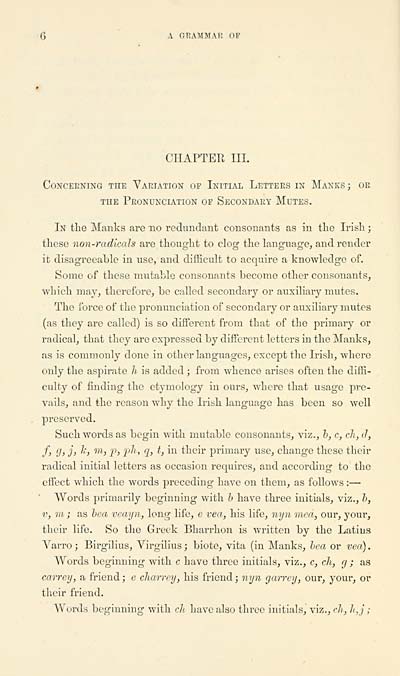Blair Collection > Practical grammar of the antient Gaelic, or, Language of the Isle of Man, usually called Manks
(54)
Download files
Complete book:
Individual page:
Thumbnail gallery: Grid view | List view

A ORAMMAR OF
CHAPTER III.
CONCEENTNG THE "VARIATION OF INITIAL LETTERS IN MaNKS ; OK
THE Pronunciation of Secondary Mutes.
In the Manks are no redundant consonants as in the Irish ;
these non-radicals are thought to clog the language, and render
it disagreeable in use, and difficult to acquire a knowledge of.
Some of these mutable consonants become other consonants,
which may, therefore, be called secondary or auxiliary mutes.
The force of the pronunciation of secondary or auxiliary mutes
(as they are called) is so different from that of the primary or
radical, that they are expressed by different letters in the Manks,
as is commonly done in other languages, except the Irish, where
only the aspirate /i is added ; from whence arises often the diffi-
culty of finding the etymology in ours, where that usage pre-
vails, and the reason why the Irish language has been so well
preserved.
Such words as begin with mutable consonants, viz., &, c, ch, d,
f} 9) j} ^'"j ''^^^j Pi I'^^i ^} ^} ii^ their primary use, change these their
radical initial letters as occasion requires, and according to the
effect which the words preceding have on them, as follows : —
Words primarily beginning with h have three initials, viz., h,
V, m ; as hea veayn, long life, e vea, his life, nyn mca, our, your,
their life. So the Greek Bharrhon is written by the Latins
Varro ; Birgilius, Virgilius ; biote, vita (in Manks, hca or vea) .
Words beginning with c have three initials, viz., c, ch, g ; as
carrcij, a friend; e charrcy, his friend; nyn garvcy, our, your, or
tlieir friend.
Words beginning with cli have also three initials, viz., ch, Ii,j ;
CHAPTER III.
CONCEENTNG THE "VARIATION OF INITIAL LETTERS IN MaNKS ; OK
THE Pronunciation of Secondary Mutes.
In the Manks are no redundant consonants as in the Irish ;
these non-radicals are thought to clog the language, and render
it disagreeable in use, and difficult to acquire a knowledge of.
Some of these mutable consonants become other consonants,
which may, therefore, be called secondary or auxiliary mutes.
The force of the pronunciation of secondary or auxiliary mutes
(as they are called) is so different from that of the primary or
radical, that they are expressed by different letters in the Manks,
as is commonly done in other languages, except the Irish, where
only the aspirate /i is added ; from whence arises often the diffi-
culty of finding the etymology in ours, where that usage pre-
vails, and the reason why the Irish language has been so well
preserved.
Such words as begin with mutable consonants, viz., &, c, ch, d,
f} 9) j} ^'"j ''^^^j Pi I'^^i ^} ^} ii^ their primary use, change these their
radical initial letters as occasion requires, and according to the
effect which the words preceding have on them, as follows : —
Words primarily beginning with h have three initials, viz., h,
V, m ; as hea veayn, long life, e vea, his life, nyn mca, our, your,
their life. So the Greek Bharrhon is written by the Latins
Varro ; Birgilius, Virgilius ; biote, vita (in Manks, hca or vea) .
Words beginning with c have three initials, viz., c, ch, g ; as
carrcij, a friend; e charrcy, his friend; nyn garvcy, our, your, or
tlieir friend.
Words beginning with cli have also three initials, viz., ch, Ii,j ;
Set display mode to: Large image | Transcription
Images and transcriptions on this page, including medium image downloads, may be used under the Creative Commons Attribution 4.0 International Licence unless otherwise stated. ![]()
| Early Gaelic Book Collections > Blair Collection > Practical grammar of the antient Gaelic, or, Language of the Isle of Man, usually called Manks > (54) |
|---|
| Permanent URL | https://digital.nls.uk/81514070 |
|---|
| Description | A selection of books from a collection of more than 500 titles, mostly on religious and literary topics. Also includes some material dealing with other Celtic languages and societies. Collection created towards the end of the 19th century by Lady Evelyn Stewart Murray. |
|---|
| Description | Selected items from five 'Special and Named Printed Collections'. Includes books in Gaelic and other Celtic languages, works about the Gaels, their languages, literature, culture and history. |
|---|

